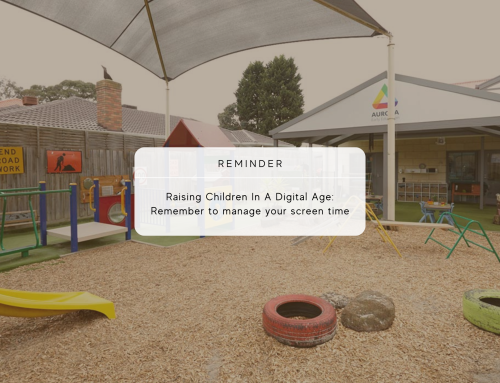Aurora Early Education aims to provide a holistic environment for our children that is constantly evolving to suit their learning and behavioural changes as they develop. We at Aurora Early Education Doncaster, Rowville, and QV always stay updated with new information and research and consider its application in our daily practice. Doing so helps us enhance our approaches towards our children and give them the best treatment they need to develop successfully.
Each month, we explore studies that have been published over the past month that reveal significant findings that could help parents and the early education community. The most recent studies explore families with multiple children managing screen time, as well as children exhibiting problematic behaviour due to less time spent at home, and a new tool that detects autism in infants and toddlers.
Screen time harder to manage with multiple children

A study by the University of Queensland has found that families with multiple children are finding it difficult to limit screen times due to the influence of older children’s screen time privileges.
The age-based screen time guideline currently suggests that children below the age of two require no screen time at all, whereas children between the ages of two to four are permitted an hour of screen time per day. And, children aged five to 12 are allowed two hours of screen time per day. However, families with children with bigger age gaps are likely to face difficulties at home when it comes to screen time and the younger sibling’s desire for more of it.
The solution to this problem would be keeping older children who have longer screen times away from the younger children whilst they are on it to limit their temptation to use devices. Some parents turn to screens as a tool to get their children to calm down when showing aggressive restless behaviour. However, the negative impacts for younger children who are recommended to stay away from screen time can be high which is why parents and caregivers ought to occupy their children with other immersive activities like physical games, storytelling, or even doing small chores around the house.
More research and policies allocated to families with multiple children are required to support their situation and help children of different ages in the same family develop optimally.
More time spent at home than at ECEC is better for children

According to research from the University of Zurich, children are likely to express negative behaviour at home when too much time is spent at an early childhood education and care (ECEC) centre.
The study surveyed over a thousand school children in Zurich who displayed signs of “problematic behaviour” after spending more time in early education care settings. This behaviour could be attributed to the lessened amount of bonding time spent with parents to strengthen attachment and interaction, or, it could be that children learn this behaviour from their play-group peers and use it to receive more attention. That being said, research shows that most children outgrow these outbursts as they progress into primary school and properly start to differentiate between home life and school life.
When children spend too much time away from their families they tend to miss out on learning how constructive family discussions take place and building self-esteem and confidence as they would naturally pick it up based on how parents interact with them and outline their strengths in a more genuine manner. Children also instinctively learn social skills, bonding, and acceptance when spending quality time with the family at home.
Although time spent in an early education facility like Aurora Early Education Centre in Rowville, Doncaster, and Aurora kindergarten QV valuably aids children’s learning, opportunities to bond at home should not be missed and will strongly support the mental and emotional development of children as they grow older.
Autism can now be detected in babies and toddlers

Research has led to a new tool being developed by La Trobe University called The Social Attention and Communication Surveillance-Revised (SACS-R), which detects the possibility of infants and toddlers developing autism later on in life.
Typically, parents are instructed to wait till there are more clear signs of their child being on the spectrum, which means children are usually around five years old when they are diagnosed. The new tool, however, was being developed for over 15 years and can now confidently be used to identify certain characteristics of children on the spectrum on infants as young as 11 months up to toddlers aged 24 months.
Previously, similar tools were created but had very low accuracy levels. The new SCAS-R provides stronger results making it a great asset for opening up more support avenues for parents to get their children developing in the best way they can. Parents and caregivers can then prepare their teaching and caring styles based on the early diagnosis and properly understand their child’s needs.
After the Victorian Government funded state-wide training for child health and maternal nurses in 2019, all Victorian children are already monitored with the SACS-R tool at every routine health check at 12, 18, and 24 months. More countries are being trained in using the tool so more children can benefit from the early diagnosis.
Sources:
Check Out Our Previous Post: Aurora’s Early Education Research Round-Up





